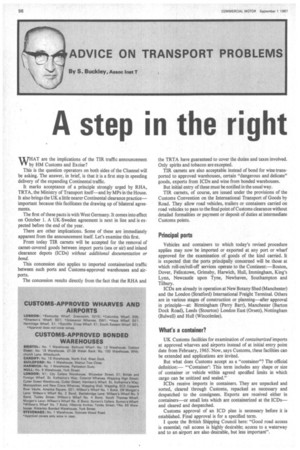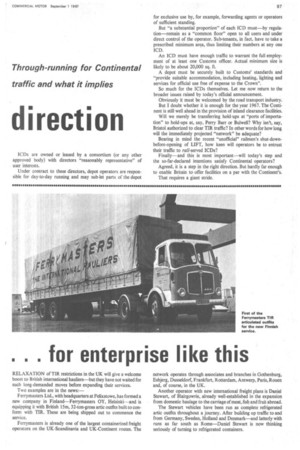A step in the right
Page 98

Page 99

If you've noticed an error in this article please click here to report it so we can fix it.
AT are the implications of the TIR traffic announcement HM Customs and Excise?
This is the question• operators on both sides of the Channel will be asking. The answer, in brief, is that it is a first step in speeding delivery of the expanding Continental traffic.
It marks acceptance of a principle strongly urged by RHA, TRTA, the Ministry of Transport itself—and by MPs in the House. It also brings the UK a little nearer Continental clearance practice— important because this facilitates the drawing up of bilateral agreements.
The first of these pacts is with West Germany. It comes into effect on October 1. A UK-Sweden agreement is next in line and is expected before the end of the year.
There are other implications. Some of these are immediately apparent from the announcement itself. Let's examine this first.
From today TIR carnets will be accepted for the removal of carnet-covered goods between import ports (sea or air) and inland clearance depots (ICDs) without additional documentation or bond.
This concession also applies to imported containerized traffic between such ports and Customs-approved warehouses and airports.
The concession results directly from the fact that the RHA and the TRTA have guaranteed to cover the duties and taxes involved. Only spirits and tobacco are excepted.
TIR carnets are also acceptable instead of bond for wine transported to approved warehouses, certain "dangerous and delicate" goods, exports from ICDs and wine from bonded warehouses.
But initial entry of these must be notified in the usual way.
TIR carnets, of course, are issued under the provisions of the Customs Convention on the International Transport of Goods by Road. They allow road vehicles, trailers or containers carried on road vehicles to pass to the final point of Customs clearance without detailed formalities or payment or deposit of duties at intermediate Customs points.
Principal ports Vehicles and containers to which today's revised procedure applies may now be imported or exported at any port or wharf approved for the examination of goods of the kind carried. It is expected that the ports principally concerned will be those at which roll-on/roll-off services operate to the Continent:—Boston, Dover, Felixstowe, Grimsby, Harwich, Hull, Immingham, King's Lynn, Newcastle upon Tyne, Newhaven, Southampton and Tilbury.
ICDs are already in operation at New Botany Shed (Manchester) and the London (Stratford) International Freight Terminal. Others are in various stages of construction or planning—after approval in principle—at: Birmingham (Perry Barr), Manchester (Barton Dock Road), Leeds (Stourton) London East (Orsett), Nottingham (Bulwell) and Hull (Wincolmlee).
What's a container?
UK Customs facilities for examination of containerized imports at approved wharves and airports instead of at initial entry point date from February, 1965. Now, says Customs, these facilities can be extended and applications are invited.
But what does Customs accept as a "container"? The official definition:— "Container': This term includes any shape or size of container or vehicle within agreed specified limits in which cargo can be unitized and sealed."
ICDs receive imports in containers. They are unpacked and sorted, cleared through Customs, repacked as necessary and despatched to the consignees. Exports are received either in containers—or small lots which are containerized at the ICDsand cleared and despatched.
Customs approval of an ICD plan is necessary before it is established. Final approval is for a specified term.
I quote the British Shipping Council here: "Good road access is essential; rail access is highly desirable; access to a waterway and to an airport are also desirable, but less important". for exclusive use by, for example, forwarding agents or operators of sufficient standing.
But "a substantial proportion" of each ICD must—by regulation—remain as a "common floor" open to all users and under direct control of the operator. Sub-tenants, in fact, have to take a prescribed minimum area, thus limiting their numbers at any one 'CD
An 1CD must have enough traffic to warrant the full employment of at least one Customs officer. Actual minimum size is likely to be about 20,000 sq.
A depot must be securely built to Customs' standards and "provide suitable accommodation, including heating, lighting and services for official use free of expense to the Crown".
So much for the 'CDs themselves. Let me now return to the broader issues raised by today's official announcement.
Obviously it must be welcomed by the road transport industry.
But I doubt whether it is enough for the year 1967. The Continent is still well ahead in the provision of inland clearance facilities.
Will we merely be transferring hold-ups at "ports of importation" to hold-ups at, say, Perry Barr or Bulwell? Why isn't, say, Bristol authorized to clear TIR traffic? In other words for how long will the immediately projected "network" be adequate?
Bearing in mind the recent "unofficial" railrnen's shut-downbefore-opening of LIFT, how keen will operators be to entrust their traffic to rai/-served ICDs?
Finally and this is most important—will today's step and the so-far-declared intentions satisfy Continental operators? Agreed, it is a step in the right direction. But hardly far enough to enable Britain to offer facilities on a par with the Continent's. That requires a giant stride.












































































































































